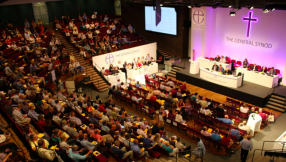
When I first began in ministry in the Scottish Highland village of Brora, we regularly received visitors who in response to the infamous 1967 Jean Darnall’s prophecy about ‘revival fire’ spreading from the Scottish Highlands to the whole of the UK, wanted to come and get a bit of the action.
Our small church was growing – and they believed we were one of the signs. To be honest they were at best a nuisance – at worst a hindrance.
Similarly, when I went to Dundee - to the centre of the Scottish revival in the 1830s and 40s, the church of Robert Murray McCheyne - we often got visitors who came on pilgrimage to our Protestant shrine, and who sometimes assured us that revival was coming.
Although the church grew significantly it was not revival. And again, the revivalists were usually more of a hindrance than a help.
I write this as someone who believes in, and longs for, real revival. Now that I am in Australia I am hearing yet again of revival in the UK. Watching from afar it is not easy to ascertain what is going on, but then distance - and experience - also gives a wider perspective which I hope will be helpful.
The reports emanating from the UK vary from cautious optimism to exultant. As an example of the latter, take this report from CBN in the US.
Numerous facts are poured out to show that ‘the quiet revival’ has arrived – not just in the UK but in the West in general. We are told that church attendance has increased over 50% in the past couple of years, with two million more people attending; that Bible sales in the US are up 22%; that 17,000 people were baptised into the Catholic church in France this Easter; that 66% of Americans have made a ‘meaningful commitment to Jesus’; that YouVersion’s Bible app and Alpha’s evangelism course are seeing record numbers; all of this is further evidenced by anecdotal evidence of more baptisms, conversions and packed churches.
Bobby Gruenewald, CEO of YouVersion, suggests that “while Christian revivals have happened throughout history, the data suggests that this revival could have an even further reaching impact. While previous revivals were localised to a particular town, region, or country, this Quiet Revival is clearly global. And where some previous momentum may have plateaued after a period of time, today’s revival shows no signs of slowing down.”
Let me first of all unpack some of this and add a note of cautious reality (hopefully not cynicism) - and then add a note of cautious optimism.
Firstly, there is no quiet revival – at least the quiet bit. This has to have been the most publicised, broadcast and commented on revival in history!
The claim that this is the biggest, best revival yet is hyperbolic wishful thinking. Previous revivals were not generally limited to a particular, town, region or country but often spread across borders – even in an age without mass media! For example, the revivals in Scotland in the mid-19th century were echoes of, and were themselves echoed in, the US. As for the impact, there is no question that the Reformation, the Disruption revivals in Scotland in 1843, the US Great Awakening, the Welsh Revival at the beginning of the 20th century, and the Hebridean Revival of the 1940s had impact that lasted decades and sometimes centuries. This current ‘revival’ is barely two years old.
What about the endlessly repeated assertion that church attendance is up by over 50%? It’s just not true. The reality is that 2,000 people out of 13,000 stated in a survey that they went to church at least once a month. This is higher than the previous survey, but it does not prove a 50% increase in attendance.
The Bible Society argues that YouGov is a reputable organisation which weights responders to filter out any bias. The problem is that a YouGov survey is not a census. It is filled out by those with sufficient interest to bother to fill out the forms and to self-report. I am a YouGov volunteer and regularly receive requests to fill out surveys. I have no interest in filling out a survey about golf, American politics or house prices in Wales! By definition those who fill out YouGov surveys are those who have signed up to do so – they are not representative of the whole population.
There is a further problem. What if they are not telling the truth? What if they really mean I would ‘like to go to church’ more than once a month? Or they consider watching a service online as being the equivalent of going to church? And anyway, why would someone going to church once a month indicate any sign of revival? I accept that there are comparative figures from a previous survey using the same methodology, but that only shows that there has been a change in the vibe of people who answer YouGov surveys.
A further difficulty is that the report states that both Church of England and Catholic churchgoers went up significantly between 2018 and 2024. Yet both these denominations have produced actual attendance figures which show a decline over that period. For example, in the Catholic Church in 2019 mass attendance figures were 829,000. In 2023 it was 555,000. In 2023 Church of England attendance was at 685,000. In 2019 it was 854,000. I am unsure why people are stating that this is a 50% increase. As Mark Twain (citing Disraeli) stated ‘there are lies, damn lies and statistics'.
Seventeen thousand people being baptised in the Catholic Church in France is not a sign of revival. It is at best a sign of renewed interest in some sections of the French population in Catholicism. But you need to take several giant leaps of (blind) faith to see this as evidence of biblical revival!
As for Barna’s assertion that 66% of Americans have ‘made a meaningful to commitment to Jesus’, it all depends on what you mean by meaningful. I recall doing Evangelism Explosion in Jackson, Mississippi where it appeared that the vast majority of people had ‘given their lives to Jesus’ – many several times! The prisons were full of ‘born agains’. Doing meaningful evangelism among people who have been told that they have already made meaningful commitments is really difficult. Give me pagans to evangelise any day!
The trouble is that the leaders of Christian ministries tend to talk up the ‘God is on the Move’ language, because their ministries depend on it. In an era of soundbites, fundraising, and a free for all in the market of Christian funding, shouting positive things loudly is at least as effective as warning everyone that the apocalypse is just around the corner!
So what is happening?
I think the evidence is pretty overwhelming that a cultural shift in some - not all - areas of the culture is happening. The impact of Jordan Peterson, Douglas Murray, Joe Rogan and other ‘conservative’ commentators has encouraged many to take a fresh look at the Bible. Maybe after all it is relevant?
There is a cultural shift towards Christianity among young people, and especially young men.
We should also be aware that a significant part of the increase is amongst ethnic minorities. For example, just before I left Scotland I was told of a significant number of new churches – which sounds like revival – but it turned out that these were all Nigerian churches. The Catholic cathedral in Dundee experienced a growth of 500 – the vast majority being Polish. It is a positive that many of the immigrants coming to the UK are Christian, but it is not revival.
Christianity is cool, Christianity is cultural, Christianity is conservative. I don’t think that any of that is wrong. But it ain’t revival. The Lord may use that and churches need to learn to surf the cultural waves, but let’s not get caught up in the hyperbole.
Natasha Moore writing for the Australian ABC on religion and ethics issues this warning: “On the more cynical end, as Christianity’s public image becomes less stodgy and more — dare I say — popular, churchgoing or reading the latest 'it' theologian may carry something with it that, in most of the West, Christianity hasn’t had for quite some time: social cachet. As one Silicon Valley entrepreneur puts it, 'I guarantee you there are people that are leveraging Christianity to get closer to Peter Thiel' — the billionaire tech venture capitalist who has been speaking openly about his evangelical faith for years.”
But what about all the anecdotes of conversions, baptisms and special meetings? For example, one newspaper article cites this as evidence for revival in Scotland: “In the year to Easter 2024, a small Baptist church on the Isle of Arran doubled in number, forcing a relocation to larger premises. Meanwhile, Skye Bible Church reported that 16 youngsters were added to the fledgling student union at Portree High School. In Pitlochry, a quarter of the local high school now attends church. And in the village of Kirkliston, 100 children and young people now attend the church’s various clubs and activities.” (Pitlochry by the way has a secondary high school of 130 – so we are talking about 35 young people attending church).
It has been ever thus. In my own experience I have seen one church go from 40 to 100. Another from seven to 250. When I became a Christian, 30 to 40 of my year at school came to our house over summer for bible study. This latter was probably the nearest to revival I have personally experienced, but it was almost destroyed by ‘revival watchers' – similar to whale watchers and bird spotters, but more spiritual – who came and told us that ‘God had told them to come up and take control of this work of the Spirit'! I remember speaking at the Nicolson Institute in Stornoway to around 100 pupils. This was all wonderful – but it was not revival.
In fact, what people are calling ‘revival’ is to me just normal church life. Or at least it should be!
What is revival?
Ian Murray’s Revival and Revivalism is a helpful book on the historical basis of revival. In terms of the last revival in the UK, read Tom Lennie’s marvellous Glory in the Glen: A History of Evangelical Revivals in Scotland 1880–1940.
In summary real revival involves conversions, powerful preaching, prayer and repentance, and it results in moral and social reformation. But most of all, real revival is a lifting up of Jesus Christ, in the power of the Spirit, to the glory of the Father. In passing, I note that many of the commentaries I have watched and read are full of talk about Christianity, sociology, data, and the excitement of seeing something happening – but very little about Christ. He is too often used as spiritual punctuation or religious language.
Five principles
1. You don’t measure revival by data.
Numbering the Lord’s peoples hasn’t always worked out well for the church! Our society is obsessed by data. Data is the new gold – and data mining the new way to get rich - and spiritually poor. This is not to say that numbers don’t matter. The more on their way to heaven the merrier. But often God does work in ways that we cannot immediately quantify. In my first charge there was a wonderful Godly woman, Barbara– if we had prophetesses in the Free Church, she would have been one!
She once told me that they had been praying for revival for decades – at one point in a time of spiritual renewal they had all night prayer meetings. She was disappointed it hadn’t come – but then she had a revelation. It had! Hundreds in that small village had become believers, several had gone to serve the Lord as ministers and missionaries. If that had happened in 40 days the whole Christian world would have heard about it. But it had taken place over 40 years. A blink in the span of eternity – but an eternity in today’s instant media world.
2. You don’t have a quiet revival by shouting about it.
"This is what the Sovereign Lord, the Holy One of Israel, says: ‘In repentance and rest is your salvation, in quietness and trust is your strength, but you would have none of it'"(Isaiah 30:15).
3. You don’t have spiritual rebirth through a general belief in God.
It’s great that some people are having more positive attitudes to Christianity and that some have even become Theists and cultural Christians ... but it ain’t enough.
"You believe that there is one God. Good! Even the demons believe that—and shudder" (James 2:19).
4. God is always at work.
Christianity is not 'back'. It was never away. One of the reasons that I did not despair when the new atheists were riding high was because a) there was nothing really new about them and b) the Lord was continuing to work. Attacking God may have been the fashion in the coffee houses of Oxford, London and New York, but the Lord who worked in the midst of the evil Roman Empire, was well able to work in the modern West - even through Richard Dawkins! For example, I estimate that I, along with many others, were able to bring God's Word to tens of thousands who otherwise would not have listened.
"So is my word that goes out from my mouth: It will not return to me empty, but will accomplish what I desire and achieve the purpose for which I sent it" (Isaiah 55:15).
5. God is sovereign.
He doesn’t need us – nor our culture warriors, strategists, spiritual influencers, bloggers, preachers, singers, experts, etc. He can, and does, use us. But He works out his plans according to His purposes. Belief in the sovereignty of God doesn’t hinder our evangelism – it liberates it.
"For I am with you, and no one is going to attack and harm you, because I have many people in this city" (Acts 18:10).
And it is precisely because I believe in the sovereignty of God that I cannot tell God what He should be doing, or even understand what He is doing. So, He may well be working through the not so quiet revival, or in spite of it. All I know is that I trust Him and that the gates of Hell cannot prevail against his Church. God wins. That’s enough for me ...
David Robertson
P.S. As a good post-millennialist I also believe that there will be a great outpouring of the Spirit before Christ returns and that the earth will be filled with the knowledge of the glory of the Lord as the waters cover the sea (Isaiah 11:9) … but that’s another discussion!













